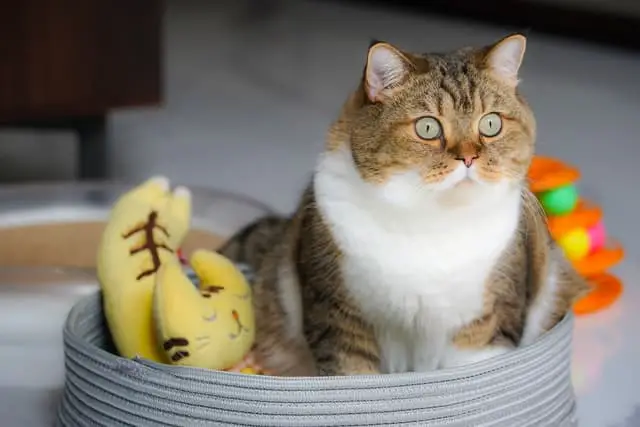
It may happen that due to some distraction the cat has ingested a foreign body, what should be done about it? This article will help you recognize the symptoms of this situation and give you advice on what you can do.
The cat is a very curious animal so it is very likely that it can ingest foreign bodies, such as rubber bands, buttons, balls, wool threads, etc.
When it comes to small objects, the cat usually expels them with feces, while larger ones could get stuck in the esophagus, stomach or intestines causing various ailments.
The symptoms that the cat shows when it has ingested a foreign body also make us understand where the object could have stopped.
If your cat has a frequent feeling of vomiting, with immediate regurgitation, it means that the foreign body is in the esophagus.
If the cat loses its appetite and has feelings of vomiting (yellowish liquid) the object is in the stomach without blocking the passage into the intestine.
On the other hand, when there is a blockage of the passage in the intestine, the cat will also have a block of defecation, apathy, foul- smelling vomiting and we will also notice a lack of appetite in the cat. It is advisable to grasp these symptoms to understand the seriousness of the situation and report it to the veterinarian.
Diagnosis
The vet will first do a complete medical history of the cat. Then he will decide which tests can be useful for the diagnosis. The exams in question are:
- Abdominal radiography: it is very important to determine the presence of the object in the cat’s body. In the event that the foreign body is not visible in the initial X-ray, a contrast agent (barium) must be used.
- Blood Tests: At the time the gastric foreign body has been diagnosed, blood tests are done to assess the cat’s health. Blood tests are recommended as the removal of most objects requires the use of anesthesia.
How do you get rid of a foreign body from the cat’s stomach?
As we said earlier, among the symptoms that we can notice in a cat that has ingested a foreign body, there are vomiting and loss of appetite.
These two symptoms can lead to dehydration and electrolyte imbalance in the cat. In this case, the vet will recommend that the cat be admitted and will administer fluids intravenously before anesthesia.
Once the cat’s health has been stabilized, the specialist will proceed, after anesthesia, to remove the foreign body through two methods:
- Endoscopy: the endoscope is a flexible instrument equipped with an optical apparatus, it is inserted into the stomach through the cat’s mouth. When the object to be extracted is located, tweezers are inserted through the endoscope, which grasp the object and pull it out of the mouth. In the event that the foreign body is too large, for example large balls or stones, endoscopy is not the right method to use, as the tweezers being small are unable to grasp the object to extract it.
- Surgery: As we said earlier if the object is too large, endoscopy is not the right method to use to extract the foreign body from the cat’s stomach. In this way, surgery is resorted to, which consists of various steps. After sedating the cat, the surgeon will shave half of its abdomen and an incision will be made along the center of the abdomen. There will then be an examination of the stomach and intestines to check where the foreign body is. Once identified, an incision will be made in the stomach or intestine and the foreign body will be extracted. The incision will then be sutured.
After the object is removed through endoscopy or surgery, there will be continuous administration of intravenous fluids to the cat until it is able to eat and drink without vomiting. In case the cat has undergone surgery, they may be given pain relievers or antibiotics.
The cat comes home

The moment the cat manages to eat and drink without throwing up, it can return to its sweet home. In the event that the cat has undergone endoscopy, it is necessary to administer a light diet for 2-3 days, after which everything can return to normal.
If, on the other hand, the cat has undergone surgery, be careful that the cat does not lick the sutures. The wound should be checked for any swelling or discharge. Generally the sutures are removed after 7-10 days.
Also in this case, the cat must be given a light diet for 2-3 days and gradually return to normal.
The only advice to prevent the cat from ingesting foreign bodies is to keep him away from objects that he could ingest. Allow the cat to nibble on objects that are difficult to swallow.






